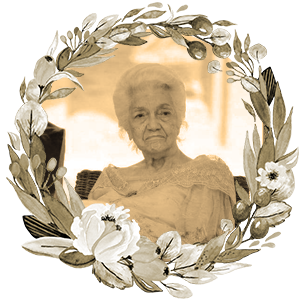
Human Rights Activist
April 9, 1921 – July 12, 2021
Maria Zeneida ‘Nini’ Quezon Avanceña was the second daughter of President Manuel L. Quezon and Doña Aurora Aragon. She devoted most of her 100 years of life to human rights and social justice causes, often defying the privileges of her class to fight for what was right.
She was born in Pasay when her father was still the Senate President, the first one of that then newly-created body. When her father became President of the Philippine Commonwealth in 1935, her life radically changed, with her youth now spent in prewar Malacañan Palace. Her mother became the first presidential spouse who was known popularly as the First Lady.
When World War II broke out, the First Family evacuated to America before the Japanese occupied the archipelago in 1942. Her father died from tuberculosis while still in office in 1944, shortly before the war ended.
The family—which included older sister Maria Aurora (Baby) and younger brother Manuel Lucio (Nonong)—soon returned to a shattered Philippines, to live in the city that bore their name. Nini married journalist and pioneering diplomat Felipe Buencamino III in 1947, bearing him two children.
Then, tragedy struck. On April 28, 1949, a convoy on the way to Baler was ambushed, allegedly staged by the Hukbalahap. Among those killed were former First Lady Aurora Quezon, who was on her way to her late husband’s hometown to open the Quezon Memorial Hospital; her daughter Baby, and her son-in-law Felipe Buencamino III.
Nini, the First Lady’s other daughter and Buencamino’s wife, escaped the same fate — she had to stay home because she was pregnant with her second child.
One can imagine how this kind of devastation would push to bitterness anyone made to suffer through such unspeakable tragedy. But hers was a progressive spirit who defied such expectations. Writing for Newsbreak in 2005, Filomeno S. Sta. Ana III of the Action for Economic Reforms wrote: “Although the communists were responsible for the death of her loved ones, [Nini] later embraced just causes for which communists bore the brunt of the struggle. She reached out to tenants in her province, encouraged them to organize, and gave them land to till. She plunged herself into many causes—human rights, press freedom, release of political prisoners, removal of the U.S. military bases, nuclear disarmament, debt cancellation, etc. She was at the forefront of the open struggle to oust the Marcos dictatorship. She was at the frontlines during the EDSA I people power that overthrew Ferdinand Marcos and during the EDSA II mobilization that forced Joseph Estrada to step down.”
In 1951, Nini married her second husband, Alberto Avanceña, the son of Chief Justice Ramon Avanceña who swore Quezon into the presidential office. They had seven children. Nini was 60 when she was widowed for the second time.
At the height of Martial Law, in 1978, Nini co-founded the Concerned Women of the Philippines together with Maring Feria, Bing Escoda Roxas, Saling Boncan, and Charo Moran, among others, to show their opposition to the dictator’s rule—even bravely publishing their manifestos on the pages of the Martial Law press, when some leniency was allowed them to show the world a pretense of freedom.
She joined Kaakbay (Kilusan sa Kapangyarihan at Karapatan ng Bayan), established by human rights icon Jose “Ka Pepe” Diokno in 1983, which advocated for non-violent activism or “pressure politics” in achieving its intentions, including the end of the dictatorship.
Between Benigno Aquino Jr.’s assassination in 1983 and the downfall of the Marcos regime in 1986, Nini participated in mass actions, often with family in tow. Her daughter Nene said that during the snap election of 1986, “all of us went to protect ballot boxes. It was really dangerous.”
When Corazon Cojuangco Aquino became president, she named Nini to the Presidential Human Rights Committee chaired by Diokno. It was created prior to the 1987 Philippine Constitution that created what is now known as the Commission on Human Rights.
But Nini was not beyond leaving or criticizing the organizations she fostered and founded, especially when they strayed from the very principles they were anchored on. After the Mendiola Massacre in 1987, Nini resigned from Aquino’s Human Rights Committee. In 2003, she questioned the decision of her own organization, the Concerned Women of the Philippines, when it decided to honor then-President Gloria Macapagal-Arroyo, whom Nini believed had curtailed human rights. She declined the invitation to attend the awarding ceremony at Malacañan, even when she was also a recipient of the same award.
She also devoted her very long life to various other causes, including the Philippine Red Cross and the Movement Against the PCO (MAPCO).
Sen. Kiko Pangilinan remembers her legacy as one of sacrifice: “Most of Tita Nini’s 100 years were as a family woman and staunch ally of justice and human rights… She lent her name and gravitas to difficult and valuable causes, including those of political detainees. She made such an impact… Her sacrifices and contributions, along with the rest of their family, will always be remembered.”
Manolo Quezon gives us an idea where her crusading self came from, and what made her tick: “She passed away surrounded by her children, at home, achieving one of the devoutest wishes of the faithful—a true Christian death, at peace with her Maker and the world… Her faith [sustained] her in adversity and [gave] her a forward-thinking approach to life that is the antidote to aging not just physically, but morally and mentally, as well.”
Quezon also remarked on the sources of her principles: “I’ve come to think that what has permanently been imprinted on me are four things that define her, to me. First and foremost in many ways, is her love of freedom. Second, her faith marked by optimism. Third, her strength of conviction tempered by empathy. Fourth, her eye for the humorous which sustains all the good things and diminishes all of the evils life and circumstance can dole out.”
0 Comments